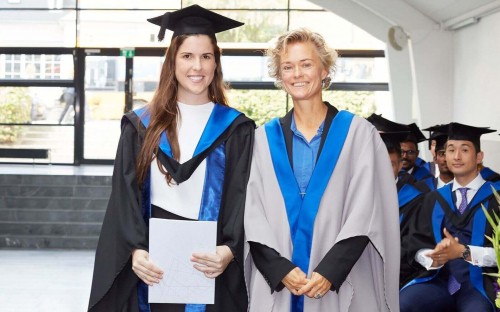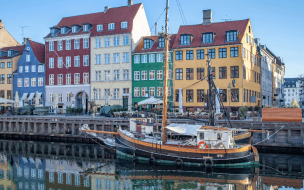Flat hierarchies, equality, and a focus on responsible management—that’s what drew Jessica Lucas to Denmark and the Copenhagen MBA. Now, she wants to launch a career in Scandinavia
Jessica Lucas hails from Brazil, where she worked for French company Danone for four years before drafting a plan to scale new heights in her career. That plan revolved around an MBA, and once she’d narrowed down her choices, there was one clear winner.—ranked among the top five globally for sustainability in the Corporate Knights Better World MBA ranking—prevailed. Jessica says Scandinavia and Denmark pose a stark contrast to her native Brazil.
“When you think about the Nordic countries, and Denmark specifically, people talk a lot about equality in gender, but also about the flat hierarchy,” she says.
“I really wanted to experience that, something that is different from my experience in Brazil. In Latin American countries hierarchy is a very big pillar, and we’re very far away from equality.”
Fatima Dhaif, Copenhagen Business School MBA’s admissions manager, admits that is a trend among the Latin American applicants she speaks to.
“Denmark offers a contrasting culture since work organizations tend to be flat, the degree of autonomy high, and the quality of life high,” she explains.
“Many Latin Americans are also interested in furthering their skills in sustainable business practices and Danish companies are notably at the forefront of this very important field.”
Copenhagen Business School prides itself on the ability to produce international MBA graduates who launch successful careers in Denmark after graduating. Indeed, about 50% of graduates remain in the country for work after their MBA.
Fernando Sasdelli, who also hails from Brazil and graduated from Copenhagen Business School’s MBA six years ago, is a case in point. He now works as a senior associate for innovation at Danish energy company, Ørsted, at the forefront of renewable energy.
The Waldemar Schmidt scholarship—set up and named after the former CEO of Danish conglomerate ISS—promotes this to students of Brazil—which it prioritizes—followed by students from Latin America and Asia. It awards successful applicants one-third off their tuition costs.
Waldemar Schmidt wants students to be able to leave the Copenhagen MBA and build businesses and jobs in their home nations. The GMAT is, of course, a vital part of the application process, but emotional intelligence (EQ) is also integral.
Strong emotional intelligence allows students to develop the mentality to be the responsible, amiable leaders of the future. Jessica says this goes further than environment responsibility, to the people you are working with and the eventual footprint you’re going to have as a company.
On , the small classroom—43 in Jessica’s cohort—allows students to become better acquainted with their peers, build relationships, and to form closer bonds with faculty. Her fellow students were key to her development, says Jessica.
She adds that they all go to Copenhagen Business School with the same ambitions—“flat hierarchy, equality, and a focus on responsible management,” she explains. “They are things I already believed in, but here it’s the core of the MBA.”
The professors who lead them mimic those ambitions. Jessica points out economics professor, Marcus Asplund, as one. She also highlights the Managing Sustainable Corporations class as a key indicator of where your education at Copenhagen Business School lies.
“It’s a great mix of academia and the real-life corporate perspective,” she explains. “We didn’t just discuss utopia and the way we wish things were, but also the way things work and how we can make a change!”
Jessica adds that the MBA showed her how good results can be for a business by having different people work together with one unilateral goal, and how rich it is to have multiple perspectives when tackling a real-life business issue.
It is possible, she says, to be a responsible manager and to have good business results at the same time—it is not a choice between the two. That’s the idea the MBA at wants to preach, and Jessica is not ready to end her education just yet.
“There’s a lot I can learn here, and I plan to stay in Denmark for some while,” she concludes, “but it’s learning that I can also bring back home whenever I decide to go back and help my country get better!”
Student Reviews
Copenhagen Business School (CBS)
CBS: efficient international network
CBS has always been ranked among the best universities in Europe and this means that it has become a sign of professionalism and success.
The academic level is great thanks to the good teachers and the atmosphere is proactive and challenging. Lots of events are planned every week and this helps you to find your own way.
CBS is not only a business school, it is a great and efficient international network.
Good academic career
I did my Bachelors at CBS and their academic excellence and career opportunities led me to pursue my Masters in Accounting, Strategy and Control. I was very lucky to go on an exchange in Singapore for one semester it boosted me to get a career in a global firm. I like that it is super modern and has all the facilities for the business student in 2019. Especially, I liked the library and Bitlab where I spent most of my time studying. However, note that it is very demanding and studying here is no joke. Everything is very competitive and you are among the most excellent business students in the country. The interaction with international students helped me to see different perspectives in business and culturally and I was lucky to make friends from any part of the world. CBS is like a brand in Denmark. Every serious business company prioritizes us over any other Danish university and also it is free for European citizens. Overall, I have a very satisfying experience at CBS and I'm looking to continue my academical career even further.
CBS is one of the best!
All I have to say regarding my experience at CBS is that it is AMAZING. Having been tutored by world-class academic staff, I can definitely support that I am receiving the best of quality regarding my studies in Digital Marketing. Staff is very friendly and easy to approach. In addition, the facilities we enjoy are top class and meet any demands. Keep in mind that, EU citizens do not pay any fees. Student life might be non-existent here, but the location of the University in The very center of Copenhagen has a huge variety of choices to offer to students regarding their entertainment. Accommodation might be a problem, but early research of the market can be very useful. In addition, the University promotes diversity. In CBS University you can meet people from the whole world which is quite interesting. I definitely suggest CBS for any student who he's interested in pursuing a career in marketing or business.
The ideal business school
I have been enrolled in this university for 2 semesters. What I took from this experience is that there is nothing better out there for those looking for professional growth while being guided by some of the top-notch professors in Scandinavia. They have a really strong focus in technology and digital transformation and they are up to date to guarantee you land a job in the modern fast-evolving world. They also embrace diversity which means many students come from any part of the world and it takes the entire learning experience to another level. You simply learn from every other student cause everyone has different experiences and background which makes you open your mind and see the world from a different angle. In Denmark, even businesses prioritize people who graduate from CBS as it's commonly perceived as the most prestigious university for business graduates.
A Place of Personal Growth
In CBS you can expect an environment of proactive thinking and growth.
The university staff is always open to help and to debate. The teaching methods balance theoretical knowledge and practical skills enabling the student with capacity and confidence to enter the job market successfully. The existence of students from all over the world stimulates discussion and promotion of different cultures, ideas and perspectives. I highly recommend this university for students in business-related areas.
Environment
The environment here is really great. Despite the well organized buildings and libraries, there are also places for students to just stay and relax also even study in the corners of each campus. The professors are mostly really nice and try to interact with students a lot. So, to sum up, the environment is really nice for studying here.
Quality education
Quality education where it emphazises the importance of academic. No finger to put on this aspect of the school.
However, sometimes the administration and IT can be lacking a bit, but in general a really good choice for education!
Best Time!
Classes are challenging and conducted in a professional manner. CBS offers a wide range of possibilities to develop outside of the classes! Libraries and other facilities on the campus are very well adjusted to the student needs.
A heavily theory-based curriculum combined with an ever-stimulating environment
I am currently a Master student at CBS, but I have also completed a Bachelor's Degree in this university. I am quite satisfied with my studies and the teaching level. However, when compared to other business schools, it becomes apparent that most courses at CBS strive to find a good balance between theoretical insight and real-life examples. Compared to my exchange university, the projects that I have found myself writing at CBS have a far less practical application and also leave little room for creativity. If the teaching is heavily theoretical, on the bright side, the university arranges a number of events throughout the year to encourage students to apply their knowledge, in the form of career fairs, case competitions, and other events organized by student associations. In my experience, teachers are very easily approachable and happy to answer your questions. A foreign student like me will find a more international environment at Master level, since the number of international (or at least non-Scandinavian) students enrolled in the Bachelor programs is quite low. However, all communication (both oral and written) from teachers and the university offices is always in English. Administrative offices, student guidance services, the career center, and the international office are definitely worth a mention. All of the requests that I have had throughout the years have always been met with kindness, promptness and efficiency.
CBS: efficient international network
CBS has always been ranked among the best universities in Europe and this means that it has become a sign of professionalism and success.
The academic level is great thanks to the good teachers and the atmosphere is proactive and challenging. Lots of events are planned every week and this helps you to find your own way.
CBS is not only a business school, it is a great and efficient international network.
Good academic career
I did my Bachelors at CBS and their academic excellence and career opportunities led me to pursue my Masters in Accounting, Strategy and Control. I was very lucky to go on an exchange in Singapore for one semester it boosted me to get a career in a global firm. I like that it is super modern and has all the facilities for the business student in 2019. Especially, I liked the library and Bitlab where I spent most of my time studying. However, note that it is very demanding and studying here is no joke. Everything is very competitive and you are among the most excellent business students in the country. The interaction with international students helped me to see different perspectives in business and culturally and I was lucky to make friends from any part of the world. CBS is like a brand in Denmark. Every serious business company prioritizes us over any other Danish university and also it is free for European citizens. Overall, I have a very satisfying experience at CBS and I'm looking to continue my academical career even further.
CBS is one of the best!
All I have to say regarding my experience at CBS is that it is AMAZING. Having been tutored by world-class academic staff, I can definitely support that I am receiving the best of quality regarding my studies in Digital Marketing. Staff is very friendly and easy to approach. In addition, the facilities we enjoy are top class and meet any demands. Keep in mind that, EU citizens do not pay any fees. Student life might be non-existent here, but the location of the University in The very center of Copenhagen has a huge variety of choices to offer to students regarding their entertainment. Accommodation might be a problem, but early research of the market can be very useful. In addition, the University promotes diversity. In CBS University you can meet people from the whole world which is quite interesting. I definitely suggest CBS for any student who he's interested in pursuing a career in marketing or business.
The ideal business school
I have been enrolled in this university for 2 semesters. What I took from this experience is that there is nothing better out there for those looking for professional growth while being guided by some of the top-notch professors in Scandinavia. They have a really strong focus in technology and digital transformation and they are up to date to guarantee you land a job in the modern fast-evolving world. They also embrace diversity which means many students come from any part of the world and it takes the entire learning experience to another level. You simply learn from every other student cause everyone has different experiences and background which makes you open your mind and see the world from a different angle. In Denmark, even businesses prioritize people who graduate from CBS as it's commonly perceived as the most prestigious university for business graduates.
A Place of Personal Growth
In CBS you can expect an environment of proactive thinking and growth.
The university staff is always open to help and to debate. The teaching methods balance theoretical knowledge and practical skills enabling the student with capacity and confidence to enter the job market successfully. The existence of students from all over the world stimulates discussion and promotion of different cultures, ideas and perspectives. I highly recommend this university for students in business-related areas.
Environment
The environment here is really great. Despite the well organized buildings and libraries, there are also places for students to just stay and relax also even study in the corners of each campus. The professors are mostly really nice and try to interact with students a lot. So, to sum up, the environment is really nice for studying here.
Quality education
Quality education where it emphazises the importance of academic. No finger to put on this aspect of the school.
However, sometimes the administration and IT can be lacking a bit, but in general a really good choice for education!
Best Time!
Classes are challenging and conducted in a professional manner. CBS offers a wide range of possibilities to develop outside of the classes! Libraries and other facilities on the campus are very well adjusted to the student needs.
A heavily theory-based curriculum combined with an ever-stimulating environment
I am currently a Master student at CBS, but I have also completed a Bachelor's Degree in this university. I am quite satisfied with my studies and the teaching level. However, when compared to other business schools, it becomes apparent that most courses at CBS strive to find a good balance between theoretical insight and real-life examples. Compared to my exchange university, the projects that I have found myself writing at CBS have a far less practical application and also leave little room for creativity. If the teaching is heavily theoretical, on the bright side, the university arranges a number of events throughout the year to encourage students to apply their knowledge, in the form of career fairs, case competitions, and other events organized by student associations. In my experience, teachers are very easily approachable and happy to answer your questions. A foreign student like me will find a more international environment at Master level, since the number of international (or at least non-Scandinavian) students enrolled in the Bachelor programs is quite low. However, all communication (both oral and written) from teachers and the university offices is always in English. Administrative offices, student guidance services, the career center, and the international office are definitely worth a mention. All of the requests that I have had throughout the years have always been met with kindness, promptness and efficiency.








